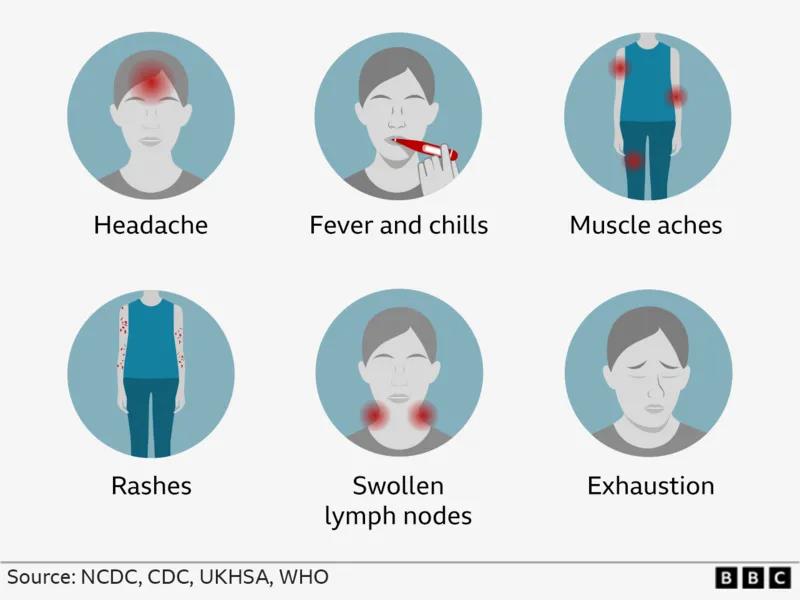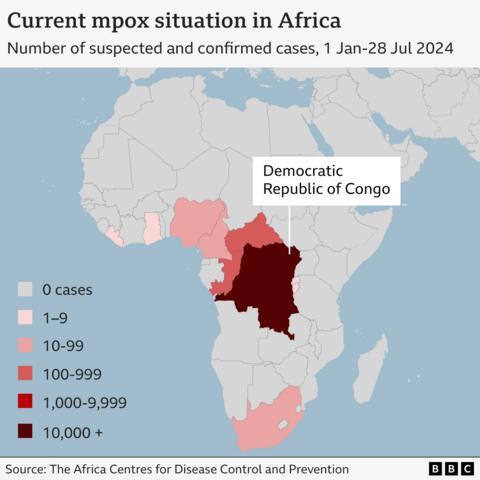(MENAFN- NewsIn)
The World health Organization (WHO) has declared the mpox outbreaks in parts of Africa a public health emergency of international concern.
The highly contagious disease – formerly known as monkeypox – has killed at least 450 people in the Democratic Republic of Congo.
What is mpox and what are the symptoms?
Mpox is caused by a virus in the same family as smallpox but is usually much less harmful.
ADVERTISEMENT
It was originally transmitted from animals to humans but now also passes between humans.
Initial symptoms include fever, headaches, swellings, back pain and aching muscles.

Once the fever breaks, a rash can develop. It often begins on the face before spreading to other parts of the body, most commonly the palms of the hands and soles of the feet.
The rash, which can be extremely itchy or painful, changes and goes through different stages before finally forming a scab, which later falls off. It can cause scarring.
The infection can clear up on its own and lasts between 14 and 21 days.
But in some cases it is fatal, particularly for vulnerable groups including small children.
Serious cases can see lesions attack the whole of the body, especially the mouth, eyes and genitals.
Which countries is mpox spreading in?
Mpox is most common in remote villages in the tropical rainforests of West and Central Africa, in countries such as the Democratic Republic of Congo (DR Congo), where it has been seen for many years.
In these regions, there are thousands of infections and hundreds of deaths from the disease annually, with children under 15 worst affected.
There are currently a number of different outbreaks happening simultaneously – mainly in the DRC and neighbouring countries.
The disease has recently been seen in Burundi, Rwanda, Uganda and Kenya, where it is not normally endemic.

There are broadly two main types of mpox – Clade 1, which is often more serious, and Clade 2.
The Clade 1 virus – that has for decades caused sporadic outbreaks in DRC – is spreading.
Some forms of Clade 1 seem to be affecting children more than adults.
There is also real concern because many people infected in the last year have had a relatively new and more severe type of mpox known as Clade 1b.
Experts say there is a lot to learn about the Clade 1b but it may be spreading more easily, causing more serious disease.
The Africa Centres for Disease Control and Prevention (CDC) says there were more than 14,500 mpox infections and over 450 deaths from mpox between the start of 2024 and the end of July. That is a 160% increase in infections and a 19% increase in deaths compared with the same period in 2023.
A previous mpox public health emergency, declared in 2022, was caused by the relatively mild Clade 2.
It spread to nearly 100 countries which do not normally see the virus, including some in Europe and Asia, but was brought under control by vaccinating vulnerable groups.
How is mpox spread?
Mpox spreads from person to person through close contact with someone who is infected – including through sex, skin-to-skin contact and talking or breathing close to the ill person.
The virus can enter the body through broken skin, the respiratory tract or through the eyes, nose or mouth.
It can also be spread through touching objects which have been contaminated by the virus, such as bedding, clothing and towels.
Close contact with infected animals, such as monkeys, rats and squirrels, is another route.
During the global outbreak in 2022, the virus spread mostly through sexual contact.
The current outbreaks in DR Congo are being driven by sexual contact and by other forms of close contact.
It has been found in other vulnerable communities, including young children.
Who is most at risk?
Anyone who has close contact with someone with symptoms can catch the virus, including health workers and family members.
Sexual contact between infected adults is thought to be one of the reasons cases are rising.
Experts are studying the situation to understand more about who is most at risk.
Young children may be among groups who are particularly vulnerable because their immune systems are still developing and many in the region have poor nutrition, making it harder to fight off disease.
Some experts suggest younger children may be at risk because of the way they play and interact with each other closely.
They will also not have had access to the smallpox vaccine, discontinued more than four decades ago, that may offer older people some protection.
Anyone with a weakened immune system may also be more prone to the disease and there is concern pregnant women may be at greater risk.
Advice is to avoid close contact with anyone with mpox and clean your hands with soap and water if the virus is in your community.
Those who have mpox should isolate from others until all their lesions have disappeared.
Condoms should be used as a precaution when having sex for 12 weeks after recovery, the WHO says.
Is there an mpox vaccine?
Vaccines exist but only people at risk or who have been in close contact with an infected person are usually able to have it.
There is real worry that there is not enough funding for vaccines to reach all those in need.
The WHO has recently asked drug manufacturers to put forward their mpox vaccines for emergency use, even if those vaccines have not been formally approved.
Now that the Africa CDC has declared a continent-wide public health emergency, it is hoped that governments will be better able to co-ordinate their response and potentially increase the flow of medical supplies and aid into affected areas.
Without global action there is real concern the current outbreak could spread beyond the continent.
MENAFN23082024000191011043ID1108593216